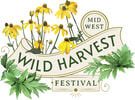Here is our tentative class list. These are subject to change, but it's a pretty good reflection of what the weekend will look like.
Midwest Wild Harvest Festival 2023
Class Schedule (subject to change)
Friday
2:30-5:00 pm
Cornelia Cho- Mushroom Class
Ellen Zachos- Backyard Foraging
Chris Gavin- Food and Medicine of the Tallgrass Prairie
Alexis Nelson- Members of the Apiaceae Family: full of friends and foes
Tom Elpel- Botany Card Games
Todd Elliott- Mushroom Hike
Crystal Brown- Foraging and the Family
Rob Greenfield- For
Potluck dinner/Wild Food Cooking Contest from 6:00 to 7:30pm
Keynote presentation: Tom Elpel 8:00pm
"Shelter, Fire, Water, Food: Survival Skills as a Path to Financial Freedom"
Saturday
Breakfast 7:30-8:45am
9-11:30 am
Sam Thayer- Plant Hike
Tom Elpel- Botany Card Games
Ellen Zachos- Wild Greens from Around the World (Sunshine)
Rob Greenfield- ??
Alexis Nelson- How Social Media Can Positively Impact Your Foraging
Linda and Luke Black Elk- Food is Medicine Walk
Crystal Brown- Foraging and the Family
Dwight Zietlow- Wild Cordials (Cedar Lodge)
Tim Clemens- Plant Walk
Saturday afternoon
Lunch 11:45-12:45
1-3pm
Ellen Zachos- The Wild Spice Cabinet (Sunshine)
Chris Gavin- Introduction to Archery
Alexis Nelson- Members of the Apiaceae Family: full of friends and foes
Cornelia Cho- Growing Mushrooms
Dwight Zietlow- Wild Cordials
Linda & Luke Black Elk- Wild Cheongs (sugar ferment)- (Eagle)
3:15-5:15 pm
Ellen Zachos- The Wild Spice Cabinet (Sunshine)
Crystal Brown- Intentional Wildcrafting: Fire cider
Chris Gavin- Food and Medicine of the Tallgrass Prairie
Cornelia Cho- Growing Mushrooms
Dwight Zietlow- Wild Cordials
Linda & Luke Black Elk- Wild Kimchi (salt ferment)- (Eagle)
OR
1-5pm
Sam Thayer- Plant Hike
Todd Elliott- Mushroom Hike
Tom Elpel- 4-hour Patterns in Plants Walk (Prerequisite: Botany Card Games required)
Cornelia Cho- Keynote Presentation 7 pm
Sunday
7:30-10 am
Sam Thayer- Plant Walk
Tim Clemens- Plant Hike
Alexis Nelson- How Social Media Can Positively Impact Your Foraging
Crystal Brown- The Art of Foraging
Todd Elliott- Mushroom Hike
Cornelia Cho- Mushroom Class
Linda and Luke Black Elk- Food is Medicine Walk
Chris Gavin- Wild Game from Field to Table (Sunshine)
Brunch 10:15-11:15am
Class Schedule (subject to change)
Friday
2:30-5:00 pm
Cornelia Cho- Mushroom Class
Ellen Zachos- Backyard Foraging
Chris Gavin- Food and Medicine of the Tallgrass Prairie
Alexis Nelson- Members of the Apiaceae Family: full of friends and foes
Tom Elpel- Botany Card Games
Todd Elliott- Mushroom Hike
Crystal Brown- Foraging and the Family
Rob Greenfield- For
Potluck dinner/Wild Food Cooking Contest from 6:00 to 7:30pm
Keynote presentation: Tom Elpel 8:00pm
"Shelter, Fire, Water, Food: Survival Skills as a Path to Financial Freedom"
Saturday
Breakfast 7:30-8:45am
9-11:30 am
Sam Thayer- Plant Hike
Tom Elpel- Botany Card Games
Ellen Zachos- Wild Greens from Around the World (Sunshine)
Rob Greenfield- ??
Alexis Nelson- How Social Media Can Positively Impact Your Foraging
Linda and Luke Black Elk- Food is Medicine Walk
Crystal Brown- Foraging and the Family
Dwight Zietlow- Wild Cordials (Cedar Lodge)
Tim Clemens- Plant Walk
Saturday afternoon
Lunch 11:45-12:45
1-3pm
Ellen Zachos- The Wild Spice Cabinet (Sunshine)
Chris Gavin- Introduction to Archery
Alexis Nelson- Members of the Apiaceae Family: full of friends and foes
Cornelia Cho- Growing Mushrooms
Dwight Zietlow- Wild Cordials
Linda & Luke Black Elk- Wild Cheongs (sugar ferment)- (Eagle)
3:15-5:15 pm
Ellen Zachos- The Wild Spice Cabinet (Sunshine)
Crystal Brown- Intentional Wildcrafting: Fire cider
Chris Gavin- Food and Medicine of the Tallgrass Prairie
Cornelia Cho- Growing Mushrooms
Dwight Zietlow- Wild Cordials
Linda & Luke Black Elk- Wild Kimchi (salt ferment)- (Eagle)
OR
1-5pm
Sam Thayer- Plant Hike
Todd Elliott- Mushroom Hike
Tom Elpel- 4-hour Patterns in Plants Walk (Prerequisite: Botany Card Games required)
Cornelia Cho- Keynote Presentation 7 pm
Sunday
7:30-10 am
Sam Thayer- Plant Walk
Tim Clemens- Plant Hike
Alexis Nelson- How Social Media Can Positively Impact Your Foraging
Crystal Brown- The Art of Foraging
Todd Elliott- Mushroom Hike
Cornelia Cho- Mushroom Class
Linda and Luke Black Elk- Food is Medicine Walk
Chris Gavin- Wild Game from Field to Table (Sunshine)
Brunch 10:15-11:15am
